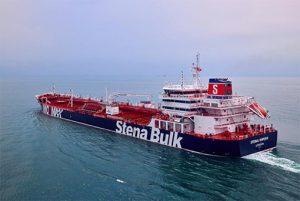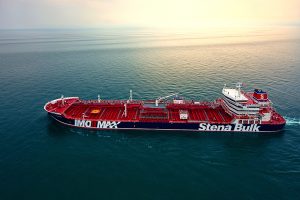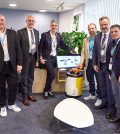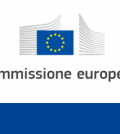Carbon capture on ships project with Alfa Laval and Stena Bulk

Alfa Laval will be a technology partner in the joint project initiated ReMarCCAcLE (Realising Maritime Carbon Capture to demonstrate the Ability to Lower Emissions) by the Global Centre for Maritime Decarbonisation (GCMD), Oil and Gas Climate Initiative (OGCI) and Stena Bulk to investigate the on-board carbon capture, storage and off-loading. The company will bring to the project technological and engineering expertise to help understand the challenges and opportunities of deploying carbon capture technology on ships. This project will be another big step towards Alfa Laval´s decarbonization roadmap.
Project ReMarCCAbLE is the world’s first project aimed at demonstrating end-to-end shipboard carbon capture at scale. The seven-member consortium will test a carbon capture unit onboard a Stena Bulk MR tanker to assess the operational challenges on a ship at sea and identify potential cost reduction measures for future commercial applications. The success of project ReMarCCAbLE has the potential to accelerate commercial deployment of shipboard carbon capture technology by 2026.
Professor Lynn Loo, CEO of GCMD, says: “GCMD is proud to convene a strong group of stakeholders to pilot one of the mid-term solutions needed to help the maritime sector to decarbonize. Project ReMarCCAbLE is in line with GCMD’s goals of lowering the barriers for adoption so international shipping can meet or exceed the International Maritime Organization’s (IMO) GHG emissions reduction targets for 2030 and 2050. We look forward to tapping on Alfa Laval’s expertise in this domain to enable the pilot”.
 Alfa Laval has been part of carbon capture testing projects and studies in the past, and the project ReMarCCAbLE will help in expanding its knowledge further in this field. By being part of this prestigious project, Alfa Laval aims at exploring the potential of the technology to meet decarbonization goals, assess the validity of the technical assumptions made during the feasibility study done by the consortium, and analyse the integration and operation challenges of fitting and running the technology while sailing.
Alfa Laval has been part of carbon capture testing projects and studies in the past, and the project ReMarCCAbLE will help in expanding its knowledge further in this field. By being part of this prestigious project, Alfa Laval aims at exploring the potential of the technology to meet decarbonization goals, assess the validity of the technical assumptions made during the feasibility study done by the consortium, and analyse the integration and operation challenges of fitting and running the technology while sailing.
Sameer Kalra, president of the Marine Division at Alfa Laval, says: “Since the production of zero-carbon fuels to scale will take some time, we see carbon capture coupled with low carbon fuels as one of the potential pathways to help the shipping industry navigate to a net zero future. This partnership is therefore an excellent opportunity towards developing such a solution. We want to evaluate the commercial and environmental implications as well as identify the challenges and opportunities in the implementation of a carbon capture system on board a vessel. The findings will help in the development of the technology at scale”.
Project ReMarCCAbLE is one of many Alfa Laval projects with sustainability in focus. By leveraging its technical know-how in thermal management and emission-reducing technology, Alfa Laval will play a vital role in facilitating this project for carbon capture on board. The project is divided into three phases. Right from the first phase of the project, Alfa Laval will be a key contributor in designing, engineering, testing and installing the solution on board the MR tanker. Not only will Alfa Laval support the project with its technological experience in this field, but it will also make Alfa Laval Test and Training Centre available for testing the carbon capture installation and to provide training to the crew before it is installed on a ship.
“For us, it is about being right at the forefront in the evolution of new sustainable technologies and supporting their development into an environmental and economically viable solution that can benefit our customers – adds Sameer -. Decarbonizing the marine industry demands a wide range of emission-reducing technologies in addition to shifting towards green fuels. We want to facilitate the development of such technologies and help reduce vessels’ carbon footprint”.
Contenuti correlati
-
Electrification of subsea isolation valves with Bosch Rexroth and PetrolValves
Bosch Rexroth and PetrolValves have signed a Memorandum of Understanding to collaborate on the electrification of subsea process valves with high SIL (Safety Integrity Level) requirements, such as Subsea Safety Isolation Valves (SSIV). Both companies are already...
-
Sustainable electromobility, Denso to invest € 67 billion in R&D
Denso is planning an investment of € 67 billion that will allow it to develop technologies for electromobility and expand its portfolio. In his first European public appearance as president and COO of Denso, Shinnosuke Hayashi revealed...
-
Steel industry, EU Commission takes action
The European Commission suggested measures to support the european steel industry sector, in order to overcome its short-term and long-term challenges. First among them, the defense against dramatic increase of exports and unfair trading practices, with 37...












